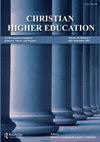Inhibitors to Christianity According to Atheist and Nonreligious Chinese Graduate Students Attending a Christian University in the United States: A Grounded Theory Study
IF 0.5
Q4 EDUCATION & EDUCATIONAL RESEARCH
引用次数: 0
Abstract
Abstract This grounded theory research investigated the experiences of 25 Chinese graduate students attending a Christian university in the United States, most of whom self-identified as atheist or nonreligious upon entry. Interview and questionnaire data identified that 23 of 25 participants experienced an overall increased openness to Christianity during their graduate studies; two students' worldview remained approximately the same. However, in that process of worldview change, all participants experienced competing influences that affected their perceptions of Christianity—some influences increased their openness to Christianity and some influences inhibited their openness to Christianity. To restate: Whereas my first article published in this journal focused on influences that increased openness to Christianity, this sequel article focuses solely on the influences participants described as having decreased (or inhibited) their openness to Christianity in theoretical–curricular and relational–cultural dimensions. These 10 inhibitors include (a) Participants’ Surprise at Discovering They Were Attending a Christian University; (b) Modern Chinese Education’s Naturalist Training; (c) Nonsystematic Presentations of Christianity; (d) Religious Pragmatism and Relativity; (e) China’s Climate of Pressure and Corruption; (f) Chinese Communist Party Membership, Affiliation, or Influence; (g) Pushy Chinese-Speaking Church Movements; (h) Cynicism of “Fake” Conversion; (i) Mockery From Peers; and (j) Perceived Hypocrisy of Christians. The article concludes with Implications for Practice for Christian university administrators and faculty working at institutions that enroll Chinese students as well as student life organizations and other personnel seeking to serve the Chinese university student population.在美国基督教大学就读的无神论和非宗教中国研究生对基督教的阻碍:一项有根据的理论研究
摘要本扎根理论研究调查了25名在美国一所基督教大学就读的中国研究生的经历,其中大多数人在入学时自认为是无神论者或无宗教信仰。访谈和问卷调查数据表明,25名参与者中有23人在研究生学习期间对基督教的开放程度总体上有所提高;两个学生的世界观大致相同。然而,在世界观改变的过程中,所有参与者都经历了影响他们对基督教观念的竞争影响——一些影响增加了他们对基督教的开放程度,而另一些影响抑制了他们对基督教的开放程度。重申一下:虽然我在该杂志上发表的第一篇文章关注的是对基督教开放程度的影响,但这篇后续文章只关注参与者所描述的在理论课程和关系文化维度上降低(或抑制)他们对基督教开放程度的影响。这10个抑制因素包括(a)参与者在发现他们上的是一所基督教大学时的惊讶;(二)近代中国教育的自然主义者培养;(c)基督教的非系统介绍;(d)宗教实用主义和相对性;(e)中国的压力和腐败气氛;(f)中国共产党的党员资格、隶属关系或影响;(g)推动中文教会运动;(h)嘲讽“假”皈依;(i)同行的嘲弄;(j)基督徒的伪善。文章的结论是对基督教大学的管理人员和在招收中国学生的机构工作的教师、学生生活组织和其他寻求为中国大学生群体服务的人员的实践启示。
本文章由计算机程序翻译,如有差异,请以英文原文为准。
求助全文
约1分钟内获得全文
求助全文

 求助内容:
求助内容: 应助结果提醒方式:
应助结果提醒方式:


